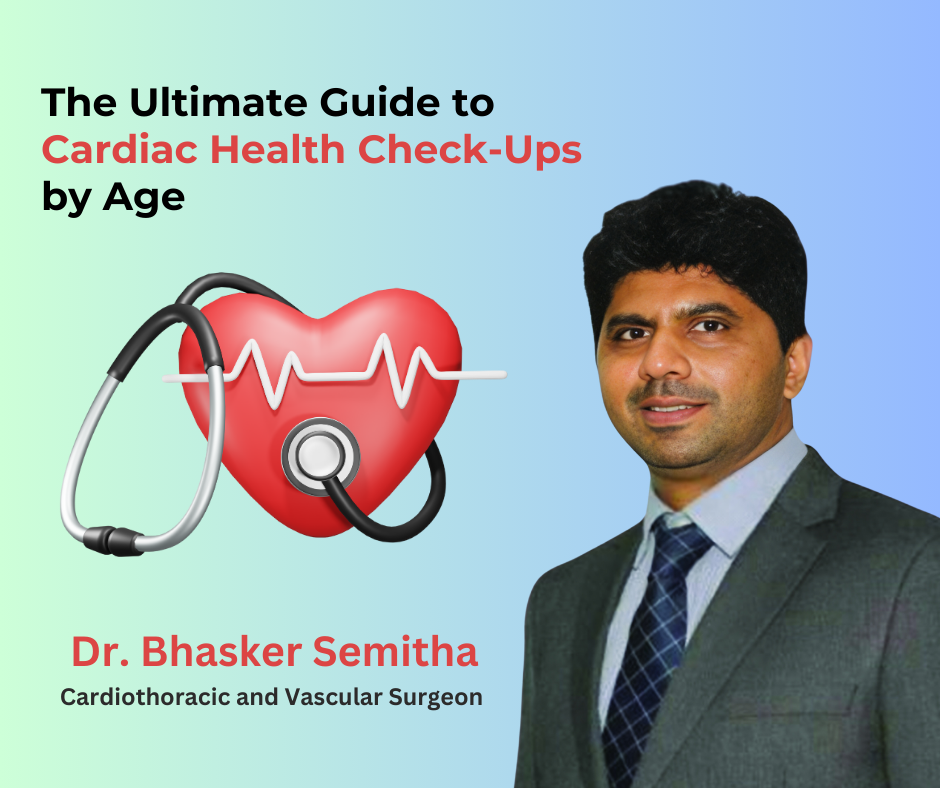Maintaining cardiac health is essential for leading a long and healthy life. Regular check-ups can help detect potential issues early, leading to better outcomes and peace of mind. Here’s a comprehensive guide on when to schedule cardiac health check-ups based on your age.

In Your 20s: Building a Foundation
Your 20s are a critical time to establish healthy habits and get baseline measurements.
- Blood Pressure: At least once every two years if normal; annually if elevated.
- Cholesterol Levels: Once in your 20s, more frequently if you have a family history of heart disease or high cholesterol.
- Blood Sugar Levels: Every 3 years, especially if you’re overweight or have other risk factors.
- Body Mass Index (BMI): Regularly monitor your weight and BMI.
- Lifestyle Assessment: Discuss diet, exercise, smoking, and alcohol use with your healthcare provider.
In Your 30s: Maintaining Momentum
Your 30s are about maintaining healthy habits and monitoring any emerging risks.
- Blood Pressure: At least once every two years if normal; annually if elevated.
- Cholesterol Levels: Every 4-6 years; more frequently if at risk.
- Blood Sugar Levels: Every 3 years, particularly if overweight or with risk factors.
- BMI and Waist Circumference: Regular monitoring.
- Stress and Mental Health: Discuss stress management techniques and mental health.
In Your 40s: Increasing Vigilance
The 40s often mark the beginning of an increased risk for heart disease, making regular check-ups crucial.
- Blood Pressure: At least annually.
- Cholesterol Levels: Every 4-6 years; more frequently if at risk.
- Blood Sugar Levels: Every 3 years; more frequently if overweight or with other risk factors.
- BMI and Waist Circumference: Regular monitoring.
- Electrocardiogram (ECG): Baseline ECG and as needed if symptoms or risk factors are present.
- Stress and Mental Health: Continued focus on stress management and mental well-being.
In Your 50s: Heightened Awareness
In your 50s, the risk for heart disease increases, necessitating more frequent check-ups and screenings.
- Blood Pressure: At least annually.
- Cholesterol Levels: Every 1-2 years.
- Blood Sugar Levels: Annually.
- BMI and Waist Circumference: Regular monitoring.
- Electrocardiogram (ECG): As needed.
- Stress Test: If you have symptoms of heart disease or are at high risk.
- Screening for Other Conditions: Such as peripheral artery disease (PAD) and carotid artery disease if you have risk factors.
In Your 60s and Beyond: Proactive Management
Regular and thorough cardiac health check-ups become even more critical as you age.
- Blood Pressure: At least annually.
- Cholesterol Levels: Annually.
- Blood Sugar Levels: Annually.
- BMI and Waist Circumference: Regular monitoring.
- Electrocardiogram (ECG): Regularly, based on your doctor’s recommendations.
- Echocardiogram: If you have symptoms of heart disease or risk factors.
- Stress Test: If you have symptoms or are at high risk.
- Comprehensive Cardiovascular Screening: Including tests for PAD, carotid artery disease, and abdominal aortic aneurysm, especially if you have risk factors or symptoms.
General Tips for All Ages
- Healthy Diet: Focus on a diet rich in fruits, vegetables, whole grains, lean proteins, and healthy fats.
- Regular Exercise: Aim for at least 150 minutes of moderate aerobic activity or 75 minutes of vigorous activity per week.
- Avoid Smoking: Smoking is a major risk factor for heart disease.
- Limit Alcohol: Drink in moderation; up to one drink per day for women and up to two for men.
- Manage Stress: Practice stress-relief techniques such as mindfulness, yoga, or meditation.
Conclusion
Regular cardiac health check-ups tailored to your age and risk factors are essential for maintaining a healthy heart. By following these guidelines and working closely with your healthcare provider, you can take proactive steps to safeguard your cardiac health throughout your life.

